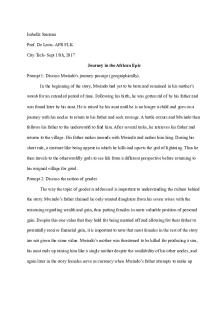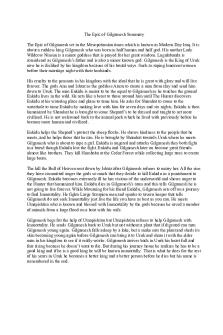The Epic Definition Types Characteristics PDF

| Title | The Epic Definition Types Characteristics |
|---|---|
| Course | Literary Theory and Criticism |
| Institution | Lovely Professional University |
| Pages | 5 |
| File Size | 105.5 KB |
| File Type | |
| Total Downloads | 93 |
| Total Views | 143 |
Summary
The Epic Definition Types Characteristics, its...
Description
10/28/21, 8:54 AM
The Epic: Definition, Types & Characteristics - Owlcation
SEP 1, 2019
The Epic: Definition, Types & Characteristics MUHAMMAD RAFIQ Muhammad Rafiq is a freelance writer, blogger, and translator with a master's degree in English literature from the University of Malakand.
Definition & Etymology of Epic It is imperative to know about the etymology of the word epic. The word epic has been derived a Greek word epikos, which means a word, song or speech. An epic is well-defined as a long story in verse dwelling upon an important theme in a most elegant style and language. According to Webster’s New World dictionary, “epic is a long narrative poem in a dignified style about the deeds of a traditional or historical hero or heroes; typically a poem like Iliad or the Odyssey with certain formal characteristics.” An epic is absolutely much like a ballad pretty much in all its features, however just one thing that differentiates epic from a ballad is its length. An epic is a long narrative in verse, while ballad is a short story in verse.
Definition of Epic Britannica Encyclopedia explains the word epic as:
"epic, long narrative poem recounting heroic deeds. .... literary usage, the term encompasses both oral and written compositions. The prime examples of the oral epic are Homer’s Iliad and Odyssey."
Characteristics of an Epic There are several characteristics of an epic , which distinguishes it from other forms of poetry . They are discussed below:
https://owlcation.com/humanities/The-Epic-Definition-Types-Characteristics
1/12
10/28/21, 8:54 AM
The Epic: Definition, Types & Characteristics - Owlcation
The first and foremost characteristic of an epic is its bulky size . An epic is an extensive and prolonged narrative in verse. Usually, every single epic has been broken down in to multiple books. For example, Homer’s epics are divided into twenty four books .Similarly, John Milton’s Paradise Lost has been divided into twelve books. Another essential feature of an epic is the fact that it dwells upon the achievements of a historical or traditional hero, or a person of national or international significance. Every epic extolls the valour, deeds, bravery, character and personality of a person, who is having incredible physical and mental traits. Exaggeration is also an important part of an epic. The poet uses hyperbole to reveal the prowess of a hero. He doesn’t think twice to use exaggeration to make an impression on the audience. Supernaturalism is a must-have feature of an every epic. Without having to use supernatural elements, no epic would certainly produce awe and wonder. There are certainly gods, demons, angels, fairies, and use of supernatural forces like natural catastrophes in every epic. Milton’s Paradise Lost, Homer’s Iliad, Beowulf and Spenser’s Faerie Queen are replete with supernatural elements. Morality is a key characteristic of an epic. The poet’s foremost purpose in writing an epic is to give a moral lesson to his readers. For instance, Johan Milton’s Paradise Lost is a perfect example in this regard. The poet wants to justify the ways of God to man through the story of Adam. This is the most didactic theme of the epic. The theme of each epic is sublime, elegant and having universal significance. It may not be an insignificant theme, which is only limited to the personality or the locality of the poet. It deals with the entire humanity .Thus; John Milton’s Paradise Lost is a great example in this regard. The theme of this epic is certainly of great importance and deals with entire humanity. It’s them is to justify the ways of God to man. Invocation to the Muse is another important quality of an epic. The poet, at the very beginning of the epic, seeks the help of the Muse while writing his epic. Look at the beginning lines of the Iliad, Odyssey and Paradise Lost. The diction of every epic is lofty, grand and elegant. No trivial, common or colloquial language is used in epic. The poet tries to use sublime words to describe the events. Use of Epic Simile is another feature of an epic. Epic simile is a far-fetched comparison between two objects, which runs through many lines to describe the valour, bravery and gigantic stature of the hero. It is also called Homeric simile.
Poll Types of Epic Folk Epic
https://owlcation.com/humanities/The-Epic-Definition-Types-Characteristics
2/12
10/28/21, 8:54 AM
The Epic: Definition, Types & Characteristics - Owlcation
Folk epic is an ancient epic, which was originally in oral form. With the passage of time, one author or many authors tried to preserve them in the form of writing. Thus, nobody happens to know about the exact authorship of the folk epics. The folk epic is different from the art epic or literary epic in the simplest sense that the former is based on a particular mythology, while the latter is based on the ideas of the author. In art epic, the poet invents the story, while the folk epic is the product of the mythology of the locality. The folk epic is basically in oral form, while the art or literary epic is in written form. The author of the literary epic is a well-known personality, while the author of the folk epic may be a common man. William Henry Hudson says in An Introduction to the Study of Literature:
“The epic of growth is fresh, spontaneous, racy, the epic of art is learned, antiquarian, bookish, imitative. Its specifically ‘literary’ qualities-its erudition, its echoes, reminiscences, and borrowings- are indeed, as the Aeneid and Paradise Lost will suffice to prove, among its most interesting characteristics for a cultured reader.” Look at the following lines taken from Beowulf:
Beowulf Lo! the Spear-Danes’ glory through splendid achievements The folk-kings’ former fame we have heard of, How princes displayed then their prowess-in-battle. Oft Scyld the Scefing from scathers in numbers From many a people their mead-benches tore. Since first he found him friendless and wretched, The earl had had terror: comfort he got for it, Waxed ’neath the welkin, world-honor gained, Till all his neighbors o’er sea were compelled to Bow to his bidding and bring him their tribute: An excellent atheling! After was borne him A son and heir, young in his dwelling, Whom God-Father sent to solace the people. https://owlcation.com/humanities/The-Epic-Definition-Types-Characteristics
3/12
10/28/21, 8:54 AM
The Epic: Definition, Types & Characteristics - Owlcation
Literary Epic Literary epic is usually known as art epic. It is an epic, which imitates the conventions of the folk epic, but gives it a written shape. It is absolutely opposite to the folk epic. They were written unlike the folk epics, which came all the way down to us through oral tradition. The literary epics tend to be more polished, coherent, and compact in structure and style when contrasted with the folk epics. Literary epics are the result of the genius of the poet. That is why; they have great significance from literary point of view. William Henry Hudson says in An Introduction to the Study of Literature:
“The literary epic naturally resembles the primitive epic, on which it is ultimately based, in various fundamental characteristics. Its subject-matter is of the old heroic and mythical kind; it makes free use of supernatural; it follows the same structural plan and reproduces many traditional details of composition; while, greatly it necessarily differs in style, it often adopts the formulas, fixed epithets, and stereo typed phrases and locutions, which are among the marked feature of the early type." Look at the lines taken from Milton’s Paradise Lost:
Paradise Lost OF MAN’S first disobedience, and the fruit Of that forbidden tree whose mortal taste Brought death into the World, and all our woe, With loss of Eden, till one greater Man Restore us, and regain the blissful Seat, Sing, Heavenly Muse, that, on the secret top Of Oreb, or of Sinai, didst inspire That Shepherd who first taught the chosen seed In the beginning how the heavens and earth Rose out of Chaos: or, if Sion hill Delight thee more, and Siloa’s brook that flowed Fast by the oracle of God, I thence https://owlcation.com/humanities/The-Epic-Definition-Types-Characteristics
4/12
10/28/21, 8:54 AM
The Epic: Definition, Types & Characteristics - Owlcation
Invoke thy aid to my adventrous song, That with no middle flight intends to soar Above the Aonian mount, while it pursues Things unattempted yet in prose or rhyme. (Paradise Lost by John Milton) © 2014 Muhammad Rafiq
Comments Moumita Das on August 20, 2020: It's really very helpful sir. Muhammad Rafiq (author) from Pakistan on August 13, 2020: Thanks Jiarul Srkian for your comments. I am glad you liked it. Jiarul srkian on August 13, 2020: Just awesome! Thanks for this masterpiece. It helps me a lot to understand the epic ins and outs. It really clear my doubts about epic. Mustafa khan on July 22, 2020: I need the definition of mock epic and classicall epic?? Biplob Nandi on May 07, 2020: I wanna know more about epic of growth. Could you please say something about it? Thanks. mrw on April 06, 2020: informative,superb Emmanuel Ozoude on February 17, 2020: Scholarly written. https://owlcation.com/humanities/The-Epic-Definition-Types-Characteristics
5/12...
Similar Free PDFs

Concept Paper Definition, Its types
- 39 Pages

The Epic of Gilgamesh - homework
- 1 Pages

Journey in the African Epic
- 3 Pages

The Epic of Gilgamesh Summary
- 1 Pages

Definition of the Nation
- 9 Pages

The types of prejudice
- 13 Pages

The Epic of Gilgamesh – Prompt 1
- 3 Pages
Popular Institutions
- Tinajero National High School - Annex
- Politeknik Caltex Riau
- Yokohama City University
- SGT University
- University of Al-Qadisiyah
- Divine Word College of Vigan
- Techniek College Rotterdam
- Universidade de Santiago
- Universiti Teknologi MARA Cawangan Johor Kampus Pasir Gudang
- Poltekkes Kemenkes Yogyakarta
- Baguio City National High School
- Colegio san marcos
- preparatoria uno
- Centro de Bachillerato Tecnológico Industrial y de Servicios No. 107
- Dalian Maritime University
- Quang Trung Secondary School
- Colegio Tecnológico en Informática
- Corporación Regional de Educación Superior
- Grupo CEDVA
- Dar Al Uloom University
- Centro de Estudios Preuniversitarios de la Universidad Nacional de Ingeniería
- 上智大学
- Aakash International School, Nuna Majara
- San Felipe Neri Catholic School
- Kang Chiao International School - New Taipei City
- Misamis Occidental National High School
- Institución Educativa Escuela Normal Juan Ladrilleros
- Kolehiyo ng Pantukan
- Batanes State College
- Instituto Continental
- Sekolah Menengah Kejuruan Kesehatan Kaltara (Tarakan)
- Colegio de La Inmaculada Concepcion - Cebu








